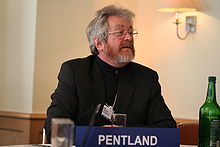Alex Pentland
Alex "Sandy" Pentland | |
|---|---|
 Alex Pentland | |
| Born | 1952 (age 71–72) Ann Arbor, MI |
| Citizenship | USA |
| Alma mater | University of Michigan Massachusetts Institute of Technology |
| Known for | Social Physics, Wearable Computing, Computational Social Science, Computer Vision |
| Scientific career | |
| Institutions | Stanford University, MIT |
| Thesis | Visual Inference of Shape: Computation from Local Features (1982) |
| Doctoral advisor | Whitman Richards |
| Doctoral students | Irfan Essa Rosalind Picard |
Alex Paul "Sandy" Pentland (born 1952) is an American computer scientist, the Toshiba Professor at MIT, and serial entrepreneur.[1] He is one of the most cited authors in computer science,[2] and helped create the MIT Media Lab.[3] He has an h-index of 125.[4]
Biography
Pentland received his bachelors from the University of Michigan and obtained his Ph.D. in Psychology from Massachusetts Institute of Technology in 1982.
He started as lecturer at Stanford University in both computer science and psychology, and joined the MIT faculty in 1986, where he became Academic Head of the Media Laboratory and received the Toshiba Chair in Media Arts and Sciences. He serves on the Boards of the UN Global Partnership for Sustainable Development Data, the American Bar Association, AT&T, and several of the startup companies he has co-founded. He previously co-founded and co-directed the Media Lab Asia laboratories at the Indian Institutes of Technology and Strong Hospital’s Center for Future Health
He directs the MIT Media Lab Human Dynamics Lab[5] and MIT Connection Science Program[6] which explore the use of big data and AI to better understand human society, and the Trust::Data Alliance[7] which is an alliance of companies and nations building open-source software that makes AI and big data safe, trusted and secure. He also manages the MIT Media Lab Entrepreneurship Program[8] which creates ventures to take cutting edge technologies into the real world. He also serves as Academic Director of Data-Pop Alliance,[9] a joint project on big data and human development co-created by the MIT Media Lab, the Harvard Humanitarian Initiative and the Overseas Development Institute.
In 2011 Forbes named him one of the world's seven most powerful data scientists[10] along with a founder of Google and the CTO of the United States.
Work
Pentland's research focuses on social physics, big data, and privacy. His research helps people better understand the "physics" of their social environment, and helps individuals, companies and communities to reinvent themselves to be safer, more productive, and more creative. He has previously been a pioneer in wearable computing,[11] ventures technology for developing nations,[12] and image understanding.[13] His research has been featured in Nature, Science, and Harvard Business Review, as well as being the focus of TV features on BBC World, Discover and Science channels.
His most recent book is Social Physics[14] which describes research that won both the McKinsey Award from Harvard Business Review[15] and the 40th Anniversary of the Internet Grand Challenge.[16] His previous book Honest Signals[17] described research chosen as Harvard Business Review Breakthrough Idea of the Year.[18] He is an advisor to the Enigma project.[19]
References
- ^ "Alex (Sandy) Pentland". Archived from the original on 2008-08-04. Retrieved 2008-08-03.
{{cite web}}: Unknown parameter|dead-url=ignored (|url-status=suggested) (help) - ^ Palsberg, Jens (Jan 31, 2018). "The h Index for Computer Science". Dept of Physics, UCSD. UCLA. Retrieved March 7, 2018.
- ^ "MIT Sloan CIO Symposium: Alex 'Sandy' Pentland". MIT Sloan CIO Symposium. 2015-05-18. Archived from the original on May 30, 2014. Retrieved 2015-05-30.
{{cite news}}: Unknown parameter|dead-url=ignored (|url-status=suggested) (help) - ^ "Alex `Sandy' Pentland". Google Scholar. Retrieved March 7, 2018.
- ^ "Alex 'Sandy' Pentland: Ethics, Human Dynamics". Media Lab. Massachusetts Institute of Technology. Retrieved March 7, 2018.
- ^ "MIT Connection Science". MIT Connection Science. Massachusetts Institute of Technology. Retrieved March 7, 2018.
- ^ "MIT Trust::Data Alliance".
- ^ MIT Media Lab Entrepreneurship Program
- ^ "Home". Data-Pop Alliance. Retrieved 2016-01-18.
- ^ Perlroth, Nicole. "#6 Alex".
- ^ Feinleib, Dave. "3 Big Data Insights from the Grandfather of Google Glass".
- ^ "D-Lab - Development through Dialogue, Design and Dissemination".
- ^ "Scientific American Frontiers - PBS Programs - PBS".
- ^ "Social Physics: How Good Ideas Spread—The Lessons from a New Science - Penguin Press".
- ^ "The 2012 McKinsey Award Winners".
- ^ "MIT News Press Center - MIT News".
- ^ Pentland, Alex (24 September 2010). "Honest Signals: How They Shape Our World". The MIT Press – via Amazon.
- ^ "Harvard Business Review - Ideas and Advice for Leaders".
- ^ "Advisors". Enigma. Retrieved 27 December 2017.
External links
- 1952 births
- Living people
- University of Michigan alumni
- Massachusetts Institute of Technology alumni
- American computer scientists
- Stanford University School of Engineering faculty
- Massachusetts Institute of Technology faculty
- Ubiquitous computing researchers
- Stanford University Department of Psychology faculty
- MIT Media Lab people
- New England Complex Systems Institute
